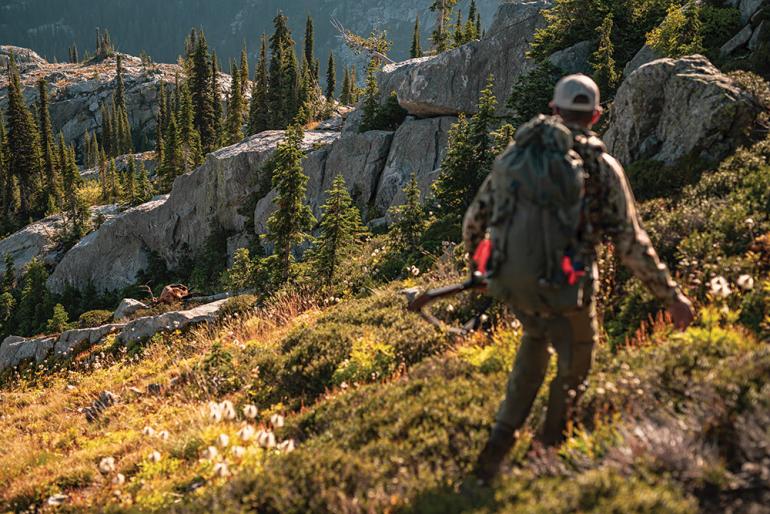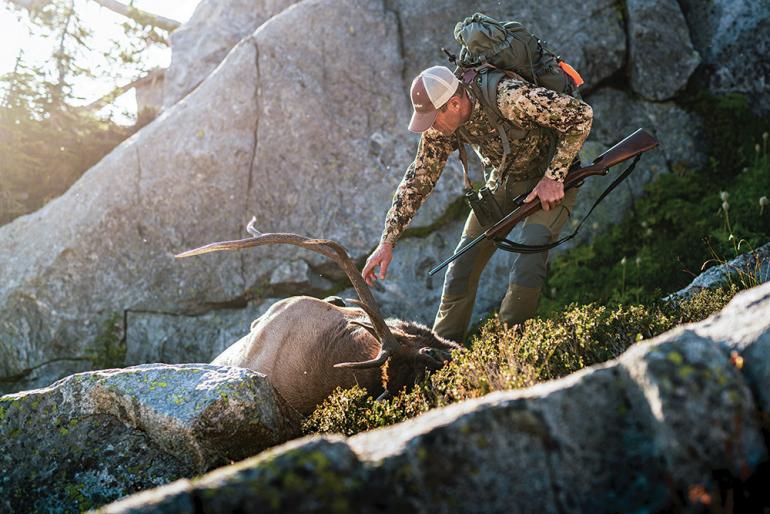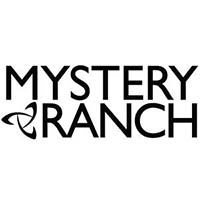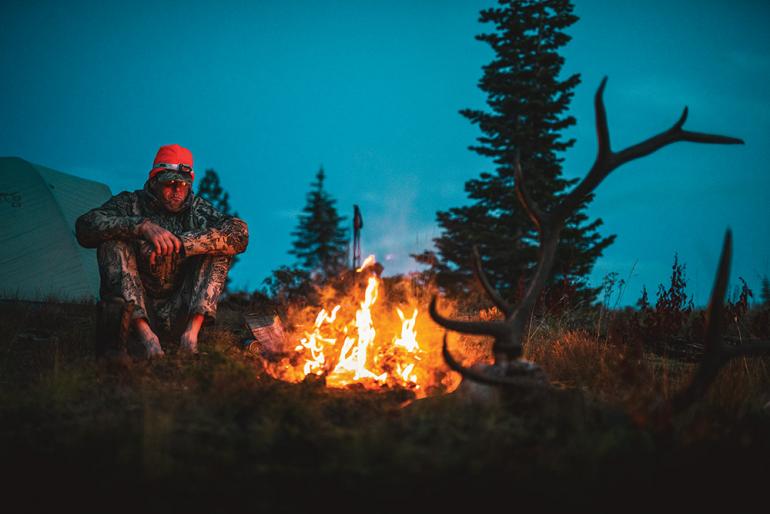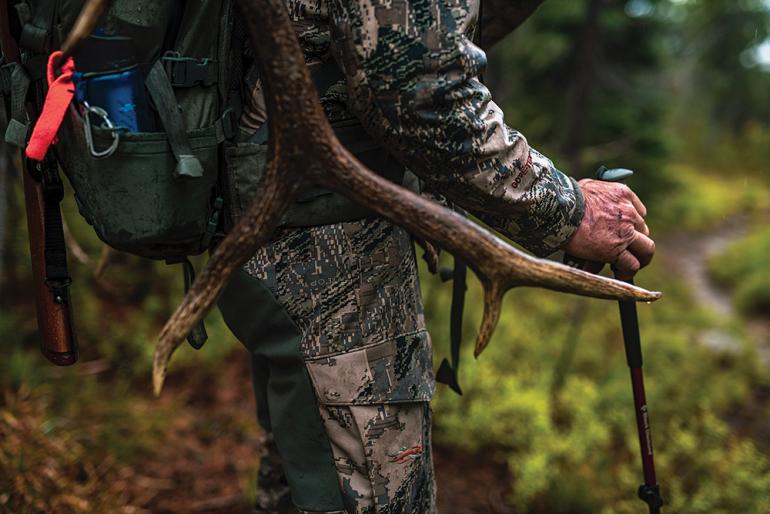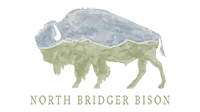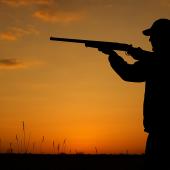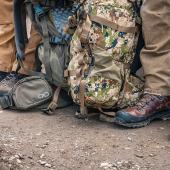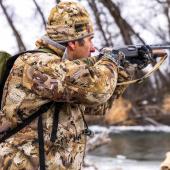Inheriting the Hunt
A father and son redefine what it means to be successful while chasing elk in wild country.
Morning sun shone on tawny hide as the bull elk weaved through granite and grouseberry. Black hooves pounded on hollow high-country soil as the bull toiled up the ridge, stopping to scream a challenge and then starting up the ridge again. He disappeared behind a copse of subalpine fir; I knelt and bugled back, bugle tube reverberating in shaking hand. Before the echo of my bugle faded, he answered, and I could hear the clatter of rock and the twisting of brush as he thundered into a small drainage between us—he was coming.
“Dad, get ready, he’s going to be here in no time,” I whispered.
Dad glanced down at the rifle in his hands, as if realizing for the first time that things were happening fast and he didn’t yet have a round in the chamber. The Mauser action on his decades-old Ruger .270 clicked open and slid back, and the bull screamed again. He was close now, 150 yards and closing.
I scanned the sparse timber below us. Tan hide flashed through an opening and the bull came into sight like an apparition, looking uphill. Dad crouched a few yards to my right and from his angle there was still no shot. My rifle sat loaded on my lap. I had a tag, too, and I pondered shooting the bull; I could kill him from here quite easily. Even shooting offhand, the range was less than a football field. If he winded us he would be gone, probably for good. And elk sure as hell aren’t easy to come by. I knew Dad wouldn’t mind; or if he did, he’d never let on.
A younger me would have shot the bull, almost certainly. For a younger me it was all bloodlust; success or failure was delineated simply by bloody hands and notched tags or lack thereof. But no, not this time. Not here, this would be Dad’s bull or no one’s.
As if sensing my decision the bull turned, stepping fast up the mountain. Now I knew how things would play out with a small measure of certainty. There comes a point in some situations where the conclusion becomes foregone, where things happen quickly and in slow motion, all at once. The hunter feels more than he thinks, and afterward there can be no recollection of conscious thought demanding action. A safety clicks off, a sudden step this way or that to clear a shooting lane; the hunter crouches or stops, moves swiftly or not at all. Often, imperceptible actions determine outcomes.
My eyes shifted back to Dad, “He’s going to be damn close, Pops. Get ready.”
The bull disappeared below us, and I could hear breath and hoofbeats and nothing else. Antlers broke the granite ridge just ahead, then ears, then the bull was there in its entirety.
At 55 yards he stood statuesque, ears and eyes swiveling, searching for the bull who’d challenged him. His breath rose into the morning light like steam from a meandering river on a November dawn. Dad crouched, unmoving. His eyes flitted back and forth below us and in a rush I realized he didn’t see the bull.
“Dad, he’s right there. Further right … no, closer. Really close! Fifty yards.”
Dad’s eyes searched with equal intensity, and when his grip stiffened on the weathered wood stock I knew he saw him. The barrel shifted up and right as Dad melded cheek to weathered wood like he had so many times before. The bull stood facing us, unmoving and quartered sharply.
The crack of the rifle seemed surreal and alien in the stillness of the morning, and for a moment time stood still. The bull stood rooted in place and then slowly craned his neck as if to look behind him at something. He didn’t run, and nothing moved, as if the universe had acknowledged that someone or something had made a terrible mistake in disrupting the quiet, and that it could be glossed over so long as it didn’t happen again.
I never heard Dad work the bolt, but now the rifle roared again and this time the bull stumbled but he didn’t fall. Then a third round crashed through his ribcage and he fell; backward and away from us, out of sight over the ridge.
The acrid smell of gunpowder filled my nostrils and I stood looking and listening for any movement from the ridge—nothing. Dad cleared the bolt and pocketed the empty and pawed through the bunchgrass for the others. He looked at me, his eyes smiling beneath his late-‘70s eyeglasses.
Dad didn’t like the killing, not a bit, I knew that. But he loved that moment. He loved the fact that it was him and me in the unbroken wilderness; blue sky and pileated woodpeckers and black bear and bugling elk. Colossal burn scars, old-growth fir thickets and granite boulder fields. He loved the fact that we were there together.
Two hours later we shouldered backpacks heavy with hindquarter and backstrap, tenderloin and gear, and soldiered up and out of the midday canyon toward camp. At 65 years old, Dad did more than his fair share, and by dark we’d managed to pack the entire bull to the trailhead. The weather was warm—too warm to keep meat overnight, so Dad loaded the bull and turned the truck toward town and coolers full of ice. I turned up the trail to camp following the beam of my headlight.
That night, Dad slept in the pickup parked afront a local butcher shop, and I lay alone in our tent beneath a myriad of stars and couldn’t keep from smiling. I was damn proud, and I wondered if perhaps I felt the same way he’d felt years earlier when I’d used that same .270 of his to kill my first elk.
As a younger man I hunted to kill, as I think many young men do. I hunted to be successful, and to me that meant going farther, climbing steeper, staying longer, and ultimately killing an animal. I thought that anyone who said they hunted strictly for meat was a liar, and in fact, I still do. There’s more to it than that.
The ultimate goal was always to be successful—to kill an animal. But watching my Dad the last few years has opened my eyes to the idea that maybe success isn’t defined so easily. That maybe I’ve been missing a serious piece of the puzzle, and that maybe success is different for us all, depending upon our progression as hunters.
For Dad, hunting has never been about the killing. This fall, there were rumors of a giant bull occasionally crossing our small ranching property, and Dad had drawn a permit for one bull elk. One day during hunting season, Dad called me and excitedly, I answered the phone. “How’d it go? Did you get him?” I asked.
“Nope, but I could have! And a nice one at that, a big six point.” he chuckled. “Way bigger than our bull.”
“What happened? Too far? No shot? What happened?” I stammered.
“Oh no. He was plenty close. And I even had the safety off once. I just didn’t shoot,” he paused a moment, thinking. “I guess I just didn’t feel like it. Maybe if you had been there I’d have shot him, I don’t know... what a nice bull.”
I laughed and nodded; a little speechless but not at all surprised. More than a decade ago, I watched as my Dad passed a goliath whitetail buck that stood broadside at 40 yards for several minutes. That time, he’d lowered the rifle and whispered, “Ah, I’m not going to shoot him.”
And at 10 years old I was angry with his decision; I mean, weren’t we out there to kill a deer? I couldn’t understand why he’d passed the buck. Now, I get it. These days, I’m following my old man’s lead—enjoying the process, appreciating the little things, and above all, appreciating the people you’re with. Dad is 65 now, and he’s still in damn good physical shape, but I know our time in the woods together is finite. So, together, we’re redefining success in the wilderness.
A version of this story originally appeared in Modern Huntsman.

